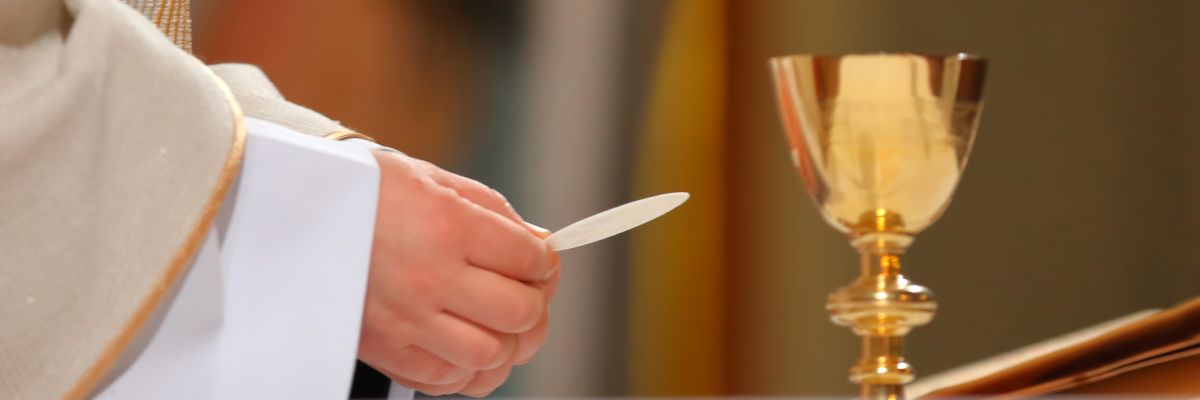
Receiving the Eucharist has aptly been compared to a husband and wife intimately consummating their union.
In marriage, conjugal intimacy both symbolizes and effects the permanent union, in which a man and a woman become husband and wife. Indeed, we don’t have intimate communion until we have fully consented to the responsibilities of the marriage covenant. The same holds true for spouses as they renew that covenant throughout their married lives.
Similarly, a person should not receive Holy Communion unless he not only believes in the Real Presence of Christ in the Eucharist but also assents to the reality that Jesus Christ founded the Catholic Church, his mystical bride (Eph. 5:31-32) and the universal instrument of salvation, and thus believes all the teachings of the Church. When a Catholic says “Amen” upon receiving Holy Communion, that’s what he is saying: he is all in for the mission of Christ and his Church. And just as there are no trial marriages, a person should not become Catholic unless he is fully on board with Christ and his Church.
“All are welcome,” as the modern hymn proclaims, but (as it should continue) you need to recognize the grave commitment you’re making in becoming Catholic. As Jesus says, “If any man would come after me, let him deny himself and take up his cross and follow me. For whoever would save his life will lose it, and whoever loses his life for my sake will find it” (Matt. 16:24-25).
Oddly enough, one Catholic scholar can’t or won’t grasp these realities, apparently because he has trouble assenting to them himself, which is rather concerning because he is also a Catholic priest.
In a recent column, Father Thomas O’Loughlin, professor of historical theology at the University of Nottingham in England, blames the Church for its discipline forbidding Protestant Christians from partaking of the Blessed Sacrament.
In his column, Father O’Loughlin refrains from using use terms like “body and blood,” “transubstantiation,” “Real Presence,” and “sacramental re-presentation of Christ’s one Sacrifice” (see Catechism of the Catholic Church 1365-67, 1374-77). Doing so would’ve helped his readers better understand why the Church takes receiving Holy Communion so seriously.
Instead, he downplays disagreements about the Eucharist or Lord’s Supper:
This is a ritual whose symbolic focus is that of people gathered around a common table, eating portions of a broken loaf and drinking from a common cup filled with wine. What each ritual element is taken to mean has been controversial for centuries, but the basic set of symbols seen as linked to the Last Supper of Jesus is common to all the churches.
Here, Fr. O’Loughlin overlooks the fact that Catholic and Orthodox Christians have always taught what Jesus first proclaimed in the Bread of Life Discourse (John 6) and in the first Eucharist he offered at the Last Supper: that the bread and wine become the sacred Body and Precious Blood of our Lord. He also omits the fact that Orthodox Churches take the Eucharist and intercommunion seriously, and that many Protestants have the integrity to not seek the Eucharist because they know what receiving it would profess, and they’re not prepared to make that assent.
The Church permits Protestants to receive the Eucharist only in “grave” circumstances, such as when a person is in danger of death, “provided that they manifest Catholic faith in respect to these sacraments and are properly disposed” (Canon 844 §4).
Fr. O’Loughlin has characterized his offerings on intercommunion as a response to Pope Francis’s call for theologians to address the matter. When asked at a Lutheran church in November 2015 about allowing greater access to the Eucharist, Pope Francis told the wife of a Catholic man, “I ask myself: ‘Is sharing the Lord’s Supper the end of a journey or is it the viaticum for walking together?’ I leave the question to the theologians, to those who understand.”
Four years after this comment was made, Fr. O’Loughlin published Eating Together, Becoming One: Taking Up Pope Francis’s Call to Theologians (Liturgical Press). Yet, in the article, Fr. O’Loughlin asks “What would Jesus do?” and outlines an argument he makes in his book for regular reception of the Eucharist by non-Catholics:
We humans need food. . . . We do not simply eat together, we share meals. . . . This has implications for the eucharist [sic] because its form is a meal – commemorating Jesus’s last supper. Can you be present and I refuse to share the food with you? Can I say that it is a meal of welcome and then not share with someone I call a “sister” or a “brother” because of Christian baptism, who asks for a share? Family meals must promote reconciliation by sharing or they are dishonest – and so unworthy of worship (emphasis added).
On the contrary, as with a courting couple who are discerning marriage, it’s dishonest to feign a unity and intimate communion that does not yet exist. Like an unmarried couple who yield to their passions, Fr. O’Loughlin seems to argue that if we just desire unity enough, God will bless our efforts. However, that’s rashly presumptuous, because our Lord has already provided clear guidelines on receiving him in the Eucharist.
As St. Paul reminds us with spiritual sobriety, “For any one who eats and drinks without discerning the body eats and drinks judgment upon himself. That is why many of you are weak and ill, and some have died” (1 Corinthians 11:29-30). That doesn’t happen with eating small portions of mere bread and mere wine.
It is a grave disservice to our fellow Christians to give them Holy Communion when reception presumes a preexisting reconciliation and moral readiness for those who would partake of it. Indeed, the Church even directs Catholics not to partake of Holy Communion unless they’re in a state of grace (CCC 1395).
True Christian reconciliation takes patience, perseverance, and childlike docility to the Lord and the teachings and guidelines he has given us. As the Second Vatican Council reaffirms, those “who belong in any way to the people of God” should be “fully incorporated” into the Catholic Church (Decree on Ecumenism, 3). And as Pope Francis also noted in his same November 2015 response on intercommunion, “I would never dare give permission to do this because I do not have the authority.”
If we explain the significance and power of the Eucharist, “the source and summit of the Christian life” (CCC 1324), and exemplify that fact by living holy lives, our approach to Christian reconciliation will be very different. We may even help reignite the faith of many Catholics and evangelize the whole world.
This is the Christ-centered basis of authentic ecumenism. This is the basis for genuine Christian reconciliation. Downplaying Christ’s Real Presence is absolutely not the route to authentic unity among Christians.



